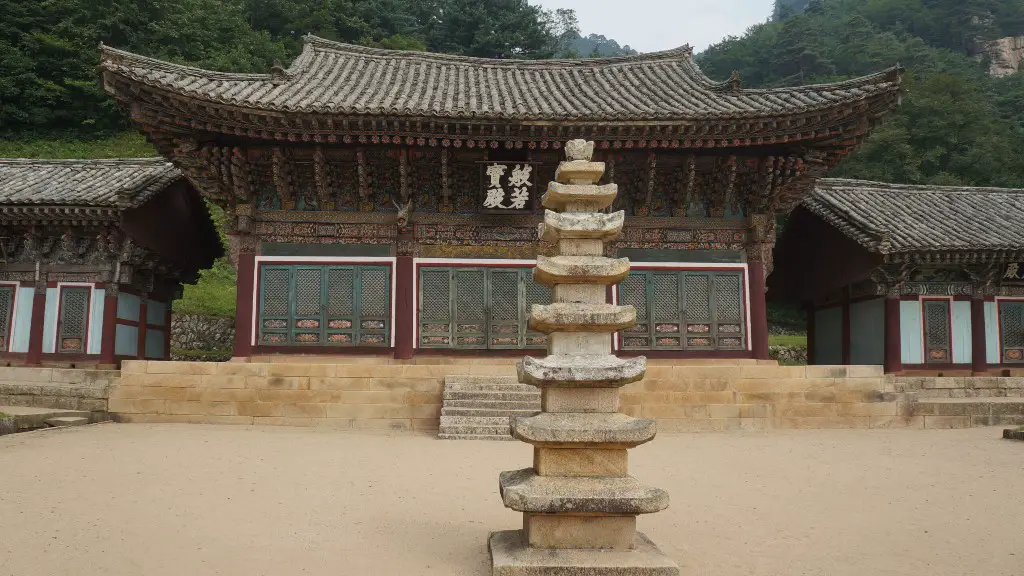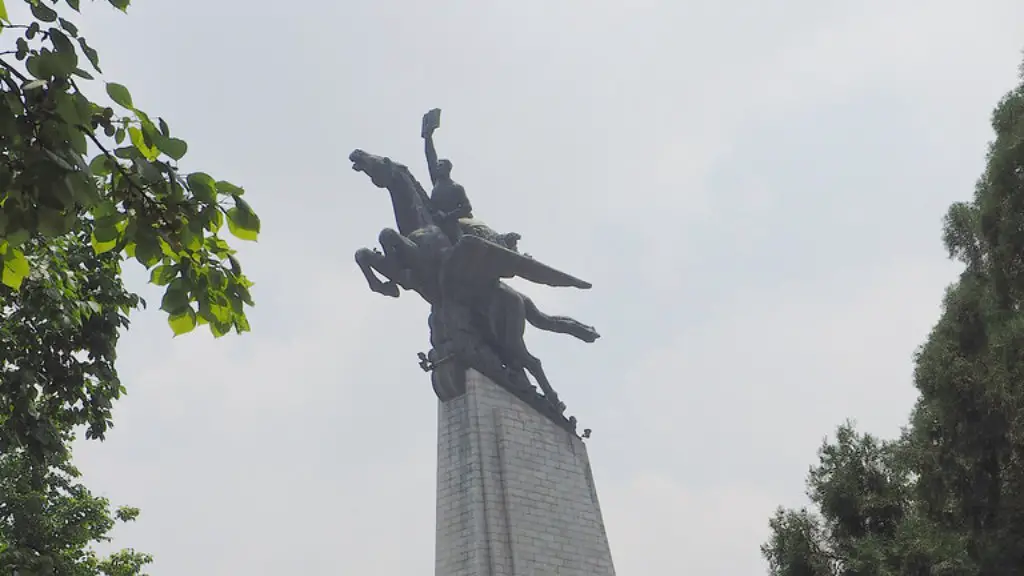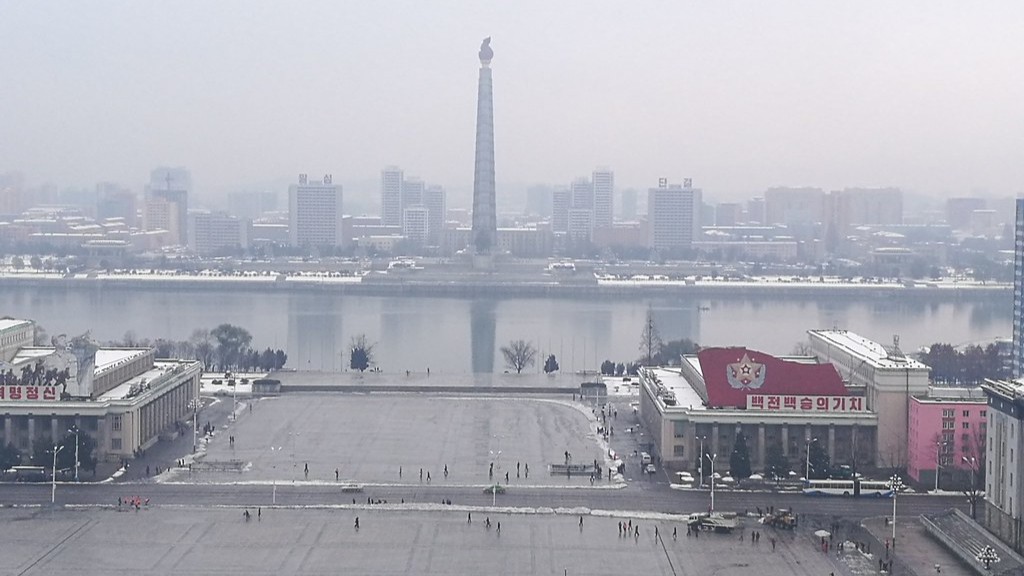The Nuclear History Between North Korea and the US
The US and North Korea have a long and tumultuous history dating back to the Korean War. In the wake of the war, North Korea was on the brink of acquiring nuclear weapons. While the US was able to convince North Korea to sign the Nuclear Non-Proliferation Treaty (NPT) in 1985, it was not able to enforce rigorous inspections and monitoring. This allowed North Korea to quickly break the agreement and restart their nuclear weapons program.
In 2003, North Korea withdrew from the NPT and made a series of nuclear tests in 2006, 2009, 2013 and 2016. During this period of time, tensions between the US and North Korea escalated to unprecedented levels. The US has consistently applied economic sanctions against North Korea and has also deployed aircraft carriers and strategic bombers near the Korean Peninsula in order to deter them from proceeding with their nuclear ambitions.
The Risk of War
The potential implications of North Korea using nuclear weapons present a risk of all-out war. Kim Jong Un, the leader of North Korea, has not shied away from threatening to engage in a nuclear conflict if provoked, and has implied that North Korea is well prepared for such a scenario. The US and its allies, including South Korea and Japan, have stated that they are ready to respond militarily if necessary.
This has contributed to a harsh stalemate, as North Korea does not want war with the US, and the US does not want to risk an attack on North Korea without assurance of success. Consequently, both sides have been hesitant in taking any actions that might trigger a nuclear exchange.
US Negotiating Tactics & Sanctions
The US has attempted to resolve the dispute diplomatically and has invited North Korea to the negotiating table on a number of occasions. However, the US’ negotiating tactics have often involved the imposition of crippling economic sanctions against North Korea, which have been effective in reducing their military expenditure but have done little to resolve the underlying tensions between the two countries.
Instead, it has further fuelled Pyongyang’s grievances against the US, as the sanctions have prevented them from accessing desperately needed resources and crippled their economy. North Korea’s continued development of nuclear weapons has been largely attributed to their feeling of insecurity and insecurity, as well as their hampered negotiations with the US.
Implications for the Region
The potential of North Korea using nuclear weapons carries significant risks for the rest of the region. North Korea is surrounded by many of the US’ allies, and the US has also made it clear that it will not hesitate to defend them in the event of an attack.
This has obviously caused a great deal of concern among North Korea’s neighbors and has prompted both Japan and South Korea to increase their military spending and defense capabilities. It has also prompted China, an important ally of North Korea, to take more of an active role in the dispute in order to ensure the region’s security.
Proposals for Peace
A number of experts have suggested that the US should explore alternative paths of diplomacy towards North Korea. This could involve a variety of measures, such as easing sanctions, providing economic assistance and offering security guarantees to North Korea. Such measures could help address Pyongyang’s security concerns, thereby reducing the likelihood of a nuclear exchange.
Other proposals include pursuing confidence-building measures and joint military exercises between North Korea and the US. Such measures could help break the deadlock between the two countries and pave the way for a long-term peace between them.
The Role of the US
The US has a major role to play in the resolution of the current crisis. If it wishes to prevent a nuclear exchange, then it must find a way to reduce tensions between the two countries and pursue a more constructive approach to negotiations. This could involve offering security assurances to North Korea, as well as providing economic assistance.
The US should also seek to involve other regional players in the dispute, such as China and South Korea. Inviting them to the negotiating table would help build trust and create a more conducive environment for negotiations.
What International Community Can Do?
In order to avert the risk of North Korea using nuclear weapons, the international community must come together to find a peaceful resolution to the current stalemate. International organizations, such as the UN or other regional bodies, should help convene a meeting between North Korea and the US, as well as other regional powers, in order to bridge the gap between the two sides and find a diplomatic resolution.
The international community should also impose its own sanctions against North Korea to pressure Pyongyang into negotiations and make it clear that any nuclear exchange will have devastating consequences.
Implications for the Rest of the World
The possibility of North Korea using nuclear weapons has global implications, as a nuclear exchange could have a damaging ripple effect across the world. The most immediate consequence would be in the region itself, where millions of lives would be put at risk. But it could also have economic and political repercussions, not only for the US and North Korea, but for the entire world.
Given the catastrophic consequences of a nuclear exchange, it is incumbent on the US and the rest of the international community to avert the possibility by finding a diplomatic resolution before it is too late.
North Korea’s Humanitarian Crisis
The recent sanctions imposed on North Korea have had a grave impact on the population and their access to food, healthcare and other basic necessities. North Korea’s government has failed to adequately respond to the humanitarian crisis in terms of providing resources for its people and has instead shifted the blame onto the US and other countries.
It is clear that the people of North Korea have been suffering greatly due to the economic sanctions and that the US must take responsibility for its role in exacerbating the crisis. As part of its efforts to find a diplomatic resolution to the current standoff, the US should explore alternatives to economic sanctions, such as providing direct aid and assistance to the people of North Korea.
The Importance of Information
Information is an important part of resolving the current crisis. The US and other countries have a responsibility to ensure that accurate and timely information is shared with the North Korean people in order to build trust and maintain open dialogue between the two sides.
In addition, the US should also continue to support organizations, such as Radio Free Asia, that provide independent reporting on North Korea in order to provide the North Korean population with access to information. Doing so could help bridge the divide between the two countries and encourage the North Korean population to take part in the negotiations.
The Role of the Media
The media has an important role to play in the resolution of the current tension between the US and North Korea. The media should continue to cover the situation objectively and accurately and refrain from sensationalizing the situation, as this could lead to further escalation of tensions.
The media should also continue to provide a platform for a diverse range of opinions and perspectives, as this can help further the constructive dialogue between the two sides. The media should also strive to cover other relevant topics, such as the current humanitarian crisis in North Korea, in order to bring greater attention to the issues and ensure that they are addressed.


